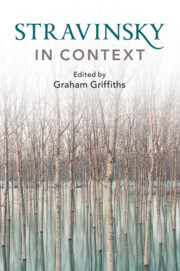Book contents
- Stravinsky in Context
- Composers in Context
- Stravinsky in Context
- Copyright page
- Contents
- Illustrations
- Contributors
- Preface
- Abbreviations
- Frontispiece
- Epigraph
- Part I Russia and Identity
- Chapter 1 Memory and Truth: Stravinsky’s Childhood (1882–1901)
- Chapter 2 Religion, Life and Death in St Petersburg
- Chapter 3 Leokadiya Kashperova and Stravinsky: The Making of a Concert Pianist
- Chapter 4 Reminiscences of Rimsky-Korsakov, His Family and Artistic Circle
- Chapter 5 Orthodoxies and Unorthodoxies: Stravinsky’s Spiritual Journey
- Chapter 6 The Russian Soul
- Part II Stravinsky and Europe
- Part III Partnerships and Authorship
- Part IV Performance and Performers
- Part V Aesthetics and Politics
- Part VI Reception and Legacy
- Recommendations for Further Reading and Research
- Index
- Endmatter
Chapter 6 - The Russian Soul
from Part I - Russia and Identity
Published online by Cambridge University Press: 03 December 2020
- Stravinsky in Context
- Composers in Context
- Stravinsky in Context
- Copyright page
- Contents
- Illustrations
- Contributors
- Preface
- Abbreviations
- Frontispiece
- Epigraph
- Part I Russia and Identity
- Chapter 1 Memory and Truth: Stravinsky’s Childhood (1882–1901)
- Chapter 2 Religion, Life and Death in St Petersburg
- Chapter 3 Leokadiya Kashperova and Stravinsky: The Making of a Concert Pianist
- Chapter 4 Reminiscences of Rimsky-Korsakov, His Family and Artistic Circle
- Chapter 5 Orthodoxies and Unorthodoxies: Stravinsky’s Spiritual Journey
- Chapter 6 The Russian Soul
- Part II Stravinsky and Europe
- Part III Partnerships and Authorship
- Part IV Performance and Performers
- Part V Aesthetics and Politics
- Part VI Reception and Legacy
- Recommendations for Further Reading and Research
- Index
- Endmatter
Summary
Start with the map. What we call ‘Russia’ is a geographically vast territory: one set of borders looks to an unambiguously Western world, the world of (often militant) Latin Christianity; another towards the self-contained cultural world of China. South-westwards lie the Balkans and what was once the ‘Byzantine Commonwealth’, as Dimitri Obolensky called the cluster of states and peoples sharing a broadly Greek Christian heritage; south-eastwards, the tribal cultures and Turkic languages of Central Asia. Russian identity has been moulded in response to – sometimes violent reaction to – all these environments, and its complexities reflect the way in which these diverse contacts and conflicts have impressed themselves on Russia’s sense of itself and its destiny.
- Type
- Chapter
- Information
- Stravinsky in Context , pp. 50 - 58Publisher: Cambridge University PressPrint publication year: 2020

